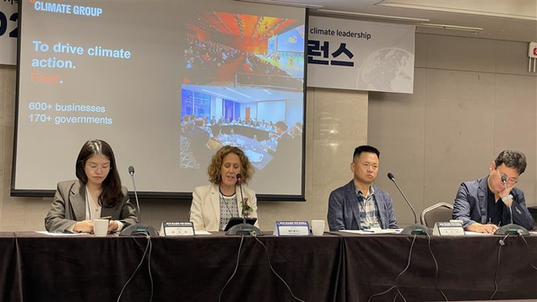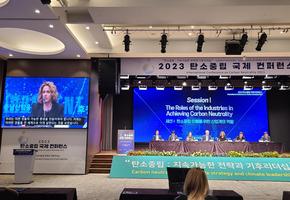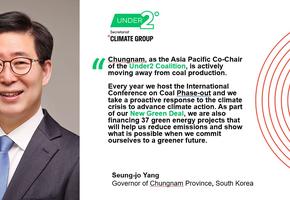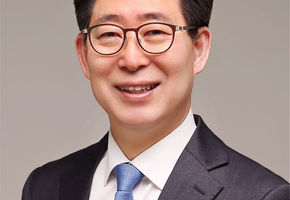I’m delighted to be here today, on behalf of both the Under2 Coalition and Climate Group, which acts as its Secretariat. Thank you to Governor Kim Tae-heum and your team for hosting this great event, and to all our under2 colleagues who have travelled to join us.
My colleagues have been to Chungnam many times before and I am pleased to make my first visit this month. I know how much work you have collectively been doing on climate change and the many ways you support our work as well - from renewable energy to net zero steel.
Leadership from Chungnam province
Chungnam became the Under2 Asia Pacific Co-Chair in 2021. Since then, it has been instrumental in paving the way for subnational climate leadership.
You’ve been inspiring others to join the Under2 Coalition in South Korea and ensuring more robust climate leadership from subnational governments in the region.
Hosting other subnational governments during this conference is an opportunity. Together, we highlight the incredibly important role states and regions can and must play for a world with no more than 1.5 degrees of warming and greater prosperity for all.
Climate Group networks
Climate Group has a mission of driving climate action, fast, bringing together governments and businesses to get to net zero emissions by 2050 at the latest.
Our work is mainly focused on systems with the highest emissions and where our networks have the greatest opportunity to drive change. They include energy, transport, built environment and heavy industry.
As CEO of Climate Group, I’ve seen the amazing things that can be achieved when governments and businesses work together.
Last month at Climate Week NYC was no exception. States and regions from around the world showed their leadership across many different forums and events.
At the opening ceremony, Governor of California Gavin Newsom announced that the state is suing oil and gas companies for their role in spreading climate misinformation. Governor Wes Moore of Maryland also demonstrated strong leadership by announcing Maryland joining the Under2 Coalition.
At the Beyond Oil and Gas convening, subnationals like Québec and Washington state reaffirmed their commitment to move away from fossil fuels. California also launched a subnational initiative on reducing methane emissions – which is such a strong step towards achieving our 2030 goals and keeping 1.5 alive.
At the UN Secretary General’s Climate Ambition Summit, 9 heads of states and regions participated together with other world leaders from countries and multilateral organisations.
We saw announcements ranging from the launch of a new platform for subnational governments at COP28 to Volvo’s pledge to end all diesel production by early 2024, as it set out plans to become an all-electric automaker.
Seeing so many people come together for one cause is inspiring. It shows just how important our climate - our world - is to individuals, businesses and governments.
A shrinking window of opportunity
The latest synthesis report from the first Global Stocktake shows us that the world is still far off track from the goals established eight years ago under the Paris Climate Agreement.
But we didn’t need to be told this. We can see the effects of climate change in front of our eyes.
2023 has been another year of rising temperatures and extreme weather events, from violent storms and flooding to prolonged droughts.
In 2022, 108 states and regional governments, representing 543 million people from 25 countries, disclosed their climate data through CDP. Of these, 81% said that they are facing significant climate hazards. That shows how global the impacts of climate change have become.
South Korea is sadly no stranger to any of this. In 2022, Seoul experienced its heaviest rainfall in 115 years, and sea levels around the country’s coastline have risen by around 10 centimetres in the last 40 years.
Only this July, more than 40 people lost their lives after heavy rain caused widespread flooding and landslides across many regions of South Korea, including Cheongju, which is very close to where we are now.
The climate crisis isn’t a hundred years away. It isn’t even a decade away. It's here, now.
All eyes on COP28
At COP28 this December we need to turn this around. Just last month the COP28 Presidency announced the first ever Local Climate Action Summit which will be held at COP28. Climate Group will also host the Under2 Coalition General Assembly at this time. We need governments at all levels to come together and find ways to increase ambition and take quick and effective action on climate change.
And this is where you come in. Subnational action is critical to both ambition and implementation. Many states and regions – especially those in the Under2 Coalition - are already leading on cutting emissions and building resilience over the last decade.
The network has now grown to more than 170 subnational governments, all committed to reaching net zero emissions by 2050 or earlier.
And it’s been a busy year for them again.
With projects on sustainable agriculture in Peru, climate finance in the US and Europe, zero-emission vehicles and just transition, subnational governments are taking action where it’s most needed to combat the climate crisis.
And we're aware that lots of this links back to fossil fuels - how to wean ourselves off them, where to look for alternative sources of energy and what this change looks like in practice.
We’ll hear more about that later today, as we look at the carbon-neutral policies of APAC governments and the specific challenges facing different parts of the world. With manufacturing making up so much of the demand for electricity, for example, we know that industrial transition needs to go hand in hand with a just transition for all people.
Moving equitably past fossil fuels
Chungnam has been vocal about the damage done by fossil fuels for quite some time. Not only has the province been phasing out coal as a leading member of the Powering Past Coal Alliance, but it has been a leading voice on just transition at as well.
The session later today on responsibility and support for developing countries is incredibly important. Progress like the 2021 regulations on the operation of the Just Transition Fund is crucial. These rules were specifically introduced to support areas of the state that are most affected by the coal phase-out.
The fund will be used to provide employment training, retraining, relocation support and job placement. This, in turn, will lead to the restoration of sites affected by coal power plants and will promote regional development.
It’s not acceptable to leave people behind as the economy shifts. Big change can be frightening and it’s our collective responsibility to make this particular change work.
I’m also very pleased to see sessions this afternoon focusing on cooperation and collaboration to decarbonise steel and methane. These are high-impact areas, and here Chungnam has also played a leading role in speaking with global audiences about the importance of these transitions.
Putting steel and methane on the agenda will contribute significantly to South Korea’s carbon neutrality goals, and now is an excellent time for governments to come together to consider relevant policy tools. For example, 11% of global carbon emissions are caused by steel – imagine the potentially transformative power of green public procurement for this single material.
Looking to the future with optimism
At Climate Group we believe in hope and in telling a positive story about progress for the environment. And there has been progress.
Nationally Determined Contributions and National Adaptation Plans have been created, updated, and implemented. And pledges from both governments and businesses have edged ever closer to action by 2030.
But progress is slow and incremental. Put simply – it’s not enough. We can’t keep going on in the same way we always have.
That’s why 2023 matters so much. This is our moment. This is your moment. Asia is the most important stakeholder in the world achieving net zero. That is why we hosted our first ever Climate Group Asia Action Summit in Singapore in June 2023. We were so grateful to the Chungnam Vice Governor for his leadership there.
The power of subnational governments
Subnational governments are first responders to the climate emergency. This gives them a lot of experience and a lot of knowledge to share.
You drive climate action locally through your policies, regulations and investment in infrastructure. This in turn incentivises further private sector investment and innovation by sending strong market signals and boosts the development of low carbon technologies.
Today, I encourage you to share your knowledge and plan action on the wide range of subjects up for discussion – including policy tools for carbon neutrality, just transition, and collaboration on steel and methane.
These will be key topics at COP28, and areas where governments like yours have vast experience. I can’t wait to see what happens when all levels of government pull together in the same direction and work with businesses on solutions to climate change.
Time is short but the possibilities for change and innovation are endless.
Let’s use today’s event to raise ambition and drive action even further – and I look forward to seeing as many of you as possible at COP28.
Thank you.



